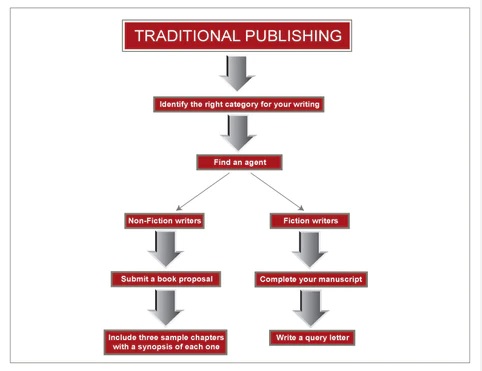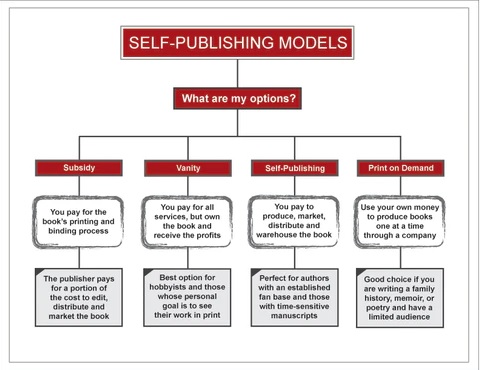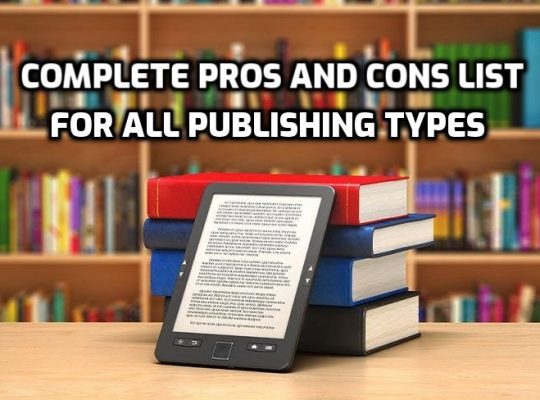How to Publish your First Novel (Fiction Book) is explained in this article to make an easy path for first-time authors.

For first-time authors, learning how to get a book published can be as daunting as writing an actual book. However, as the book publishing industry shifts toward digital publishing options in addition to traditional publishing, first-time novelists have increased opportunities to get published.
Traditional Publishing vs. Self-Publishing
New authors seeking to distribute their first fiction or nonfiction book have two publishing options. One is to sign a book deal with a traditional publisher. Such a deal, which is traditionally facilitated by a literary agent, gives the publisher exclusive rights to print and disseminate the book. An author works with an editor at the publishing house to execute a fixed number of drafts. Whether or not the novel ultimately sees the light of day is at the discretion of the publishing company.
Many first-time authors, however, prove their chops in the world of self-publishing. Self-published authors eschew the publishing house and get their novels out into the world on their own. They do this by making the book available for print-on-demand, as an ebook, as an audiobook, or by printing and selling copies of the book themselves.
We are going to cover both of these ways here in this article:
How the Traditional Publishing Process Works
The traditional publishing process generates the vast majority of books that are read by large audiences. Every novel you see listed on the New York Times bestseller list was issued by a traditional publisher. You don’t have to be a bestselling novelist like Dan Brown or David Baldacci to score a publishing deal. Writers with far more modest book sales still can land deals with prominent publishers like Random House, Penguin, Knopf, Riverhead, and others.
The traditional publishing process runs through literary agents. These professionals are the gatekeepers to the publishing world. With the support of a well-connected agent, a great book can reach the most prestigious publishers in the world. Publishers have been known to offer publishing deals to writers who lack agents, but the process is considerably harder.
Ways for Famous Writers
Famous authors will frequently be offered a multi-book publishing deal with monetary advances paid up front, thus giving them a home for works that don’t even exist yet. Unsolicited manuscripts can also find their way to publishers, provided that authors follow the proper steps. Here are some tips for getting your book published through traditional avenues. Note that these are not writing tips; they specifically concern the publishing process.
How to Publish Novel Traditionally

Make sure the first chapter does your book justice
“It’s all about that first chapter. I will read for as long as I can and if I get bored I don’t read any further. There is a myth that an editor reads a full manuscript but we don’t, it’s not possible.” Karolina Sutton
Edit and proofread
One or two typos won’t sink your career, but a bevy of them will make you look unprofessional. Remember that you may only get one chance with a publisher or literary agent; make sure they are seeing the best work you have to offer.
Hire a Strong Editor
“Find the best editor available to help you polish your manuscript into the best possible shape. An editor can help you find gaping holes that need to be filled and ways to get your message across succinctly and persuasively. To help you save money, make sure that you’ve performed your own self-edits before you send it to your editor so she doesn’t have to correct punctuation and grammar.” ~ Nicole Munoz, Start Ranking Now
Identify a target audience for your book
A writer’s market for publishing houses is determined by their book’s market—the potential audience who would be interested in their book. Within the publishing industry, certain genres hold more appeal than others. In the world of literary fiction, these include children’s books, young adult novels, science fiction, fantasy, thrillers, and romance novels. A great book can be written in any genre, but these are simply the genres with the most reliable audiences.
Make sure your writing is relevant
“I often find that people are very good writers but don’t have a story. The work is really polished, the writing is superb, and the sentences work on an exquisite level but you wouldn’t want to spend three hours in the company of the characters. Your story needs to have something urgent to say culturally that will grab the editor’s attention.” Karolina Sutton
Identify potential agents
While having an agent doesn’t guarantee your book will find a publisher, it certainly helps. Most agents and agencies have websites that stipulate their preferences, along with methods for querying. The annual Writer’s Market publication also compiles a list of all working agents.
Don’t just send your manuscript to anyone. “Think very carefully about who you are going to send it to. Choose about four or five editors or agents. Anything beyond that feels indiscriminate.” Karolina Sutton
Finish the novel before you try to get an agent. Get it all down on paper, let it sit, edit it, and edit it again until you’ve made it as good as you can get it alone.
Sculpt a brilliant synopsis
“The better the synopsis, the better your chances of getting published.” Alexandra Pringle
Submit your book proposal to an Agent
Most literary agents do not want you to send an entire novel as part of a cold call. Here are some things they likely will want: A query letter, a 1-2 page synopsis of the entire novel, and 1-5 sample chapters. These combined elements form your book proposal.
Sample chapters. When sending sample chapters from your novel or memoir, start from the beginning of the manuscript. (Don’t select a middle chapter, even if you think it’s your best.) For nonfiction (non-memoir), usually, any chapter is acceptable.
Your agent won’t charge you anything upfront, but they will later take 15% of your proceeds. It’s kind of like a real estate agent getting a commission or an attorney representing a client on contingency. Before you worry about giving up 15%, remember that if they can’t sell your book, no matter how much effort they put in, they don’t see a penny.
Submit directly to a publisher
If you don’t have an agent, you can sometimes submit directly to a publisher—just know your odds of acceptance are very slim. In the vast majority of cases, though, publishers will only consider a novel submitted by a reputable literary agent. The exceptions to this rule are if you are submitting a niche novel to a niche publishing house, or if you have a personal connection to an editor who’d be willing to read you on account of that relationship.
“As a publisher, you rely so much on agents to know your taste and your company. It’s like a dating agency in a way. You are more likely to read submissions from agents that you trust and who have a good reputation.” Alexandra Pringle
Don’t be put off by rejection
“So many first novels that are hugely successful have previously been turned down. And people can’t believe it was previously turned down – but that’s just because it wasn’t the right publisher for that story.” Alexandra Pringle
“When you get that rejection letter it just means that that agent or that publisher doesn’t know what to do with it – that’s all it means. They aren’t the right person for your book. You have to keep going.” Karolina Sutton
Self Publishing Novel

Methods for Self-Publishing a Novel
Today’s indie authors have more resources than ever for getting their work in front of readers:
Via print-on-demand
Perhaps the lowest-risk publication method in the publishing world is print-on-demand, where copies of a book are only printed when someone orders one. First-time fiction writers often enlist companies like Amazon for print-on-demand novels.
As an ebook
Issuing digital copies of a book on an on-demand basis is even easier, as it requires no paper and no printing apparatus.
Via self-printing (Vanity Publishing)
You can self-print books in advance of publication and hope they will sell later. This is sometimes pejoratively called vanity publishing. If your book catches on, you will happily sell through your self-published copies. If it fails to find an audience, you could be stuck with stacks of your book gathering cobwebs in your home.
As an audiobook
Today’s audiences frequently consume novels as audiobooks. Much like printed novels, audiobooks can be issued by a traditional publisher or by the author themselves. In either scenario, you will require a narrator, who may be called upon to record dozens of hours of prose narration.
How to publish by Entering a Literary Contest
Participating in a literary contest is a quick shortcut to gaining the attention of an agent. Or, even better, earning a contract from a major publisher. For example, Minotaur Books and the Mystery Writers of America sponsor a First Crime Novel Competition. The winner of this contest is awarded a $10,000 advance and a publication contract with Minotaur. The downside is that there are a limited number of reputable contests like this. Consequently, if you don’t win, you are back to square one.
To make the most of this effort, make sure your manuscript is immaculate. Remember, this is a competition and the best book wins. Hire an editor who can polish your book, and a book cover designer to create a stunning cover. Once your book is the best it can be, follow these steps:
Select a contest. Peruse lists of open writing contests to find one that aligns with your genre. Keep in mind that many of the contests do require a submission fee.
Follow the guidelines. Each contest specifies submission requirements, which must be followed to the letter. Note the deadlines, and set reminders, so you will have plenty of time to get your manuscript prepared and submitted on time.
Submit your entry. Following the submission guidelines, email or mail your manuscript to the contest. Good luck!
Hybrid Publishing
There’s also a third publishing approach that is rarely discussed — hybrid publishing — which is a middle ground between traditional and self-publishing.
A hybrid publishing deal is a publishing model that charges the author upfront costs for producing the book and takes a percentage off of sales for their book distribution services. At the same time, authors keep the rights to their books. A hybrid publisher is responsible for keeping all their services and books up to the industry’s standards, including editing, interior design, and book cover design.
In 2018, Independent Book Publisher Association (IBPA) defined 9 criteria hybrid publishers should meet.
According to the criteria, a hybrid publisher should
- Define a mission and vision for its publishing program.
- Vet submissions
- Publish under its own imprint(s) and ISBNs.
- Publish to industry standards
- Ensure editorial, design, and production quality.
- Pursue and manage a range of publishing rights.
- Provide distribution services.
- Demonstrate respectable sales.
- Pay authors a higher-than-standard royalty.
Is hybrid publishing the same as vanity publishing?
Hybrid and vanity publishers are two different publishing styles. Though hybrid and vanity press are really similar on the surface level, which can be confusing.
The main difference between hybrid and vanity publishers is that vanity publishers don’t earn money from your book sales and don’t care about which books they accept. Vanity publishers earn from authors’ desire to release a book no matter its quality (hence, the name vanity).
At the same time, hybrid publishers are genuinely interested in seeing their books succeed because they also get a share of royalties.
Besides, if a hybrid publisher fails to uphold the industry’s standards, it won’t qualify as a hybrid publisher by the IBPA criteria. As a result, the publisher’s reputation will suffer, and authors will be less likely to work with them.
Hybrid publisher vs vanity publisher warning!
Still, such a similarity between vanity and hybrid publishers means that you have to be cautious. Better to double-check hybrid publishers before working with them. One of the ways to do it is to check watchdog lists, such as this list by the Alliance of Independent Authors.
How do I know which one is right for me?
If seeing your work in print is to fulfill a personal goal you have or you view yourself as a hobbyist, choose vanity publishing.
If you’re writing a family history, memoir, or book of poetry that has a limited audience, and don’t want your book stocked at bookstores, using POD is probably to your advantage. They are often nonreturnable, not sold at a discount, and you won’t have to store any unsold books.
Printing in bulk via self-publishing may be your best bet if you have a visible platform established to reach your audience, both online and offline (such as a website, Twitter handle, and Facebook fan page), have credibility with your readers in your genre/category and are prepared to dedicate your time to marketing and promoting your work.
Self-publishing is also a good option if you have a time-sensitive manuscript, as a commercial publishing company can take up to 18 months to get your book from manuscript to final production.
On the flip side, here are a few things to consider. If you don’t know how to find or reach your readers, don’t have an online presence, don’t have the time to spend online or dislike social media, want to be in a brick-and-mortar type of bookstore and have a publisher handle the marketing for you, the traditional publishing route may be the best option.
Ultimately it is up to you to decide!
If you want to use author service companies, then please check the following resources:
- Preditors and Editors – a watchdog site for authors with listings of which publishers are recommended and which are scams
- Writer Beware – Lots more about scams against authors and companies to watch out for
- Choosing a self-publishing service – by the Alliance of Independent Authors, available in all online bookstores. Written by authors and for authors so you get unbiased advice. Also, check out the Self Publishing Advice blog which includes watchdog articles.
If you enjoyed “How to Publish your First Novel” you may also like:
Complete Pros and Cons List for All Publishing Types
Source:
Masterclass https://www.masterclass.com/articles/how-to-get-your-novel-published
Harper Bazaar https://www.harpersbazaar.com/uk/culture/a20893693/how-to-get-your-book-published/
Gate Keeper Press https://gatekeeperpress.com/how-to-get-a-book-published-for-the-first-time/
Writers Digest Shop https://writersdigestshop.com/pages/how-to-publish-a-book-an-overview-of-traditional-self-publishing
Small Biztrends https://smallbiztrends.com/2017/03/publishing-your-first-book.html
Tiffany Hawk https://www.tiffanyhawk.com/blog/how-to-get-your-book-published-traditionally
miblart https://miblart.com/blog/traditional-vs-self-publishing-which-is-better/
The Creative Pen https://www.thecreativepenn.com/self-publishing-vs-traditional/







[…] And if you are creative and love stories then you can pursue becoming a novelist. Even after writing your fictional novel, you have a long way to publish it that you can find all about it in our article: How to Publish your First Novel (Fiction Book) […]
[…] How to Publish your First Novel (Fiction Book) […]
[…] How to Publish your First Novel (Fiction Book) […]